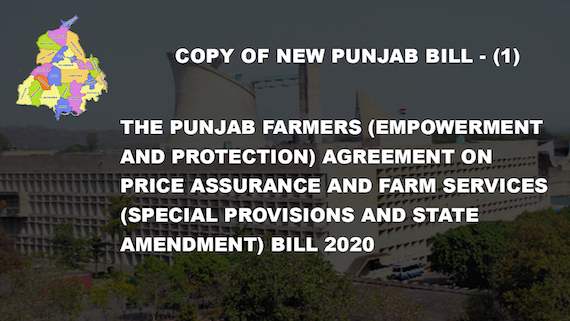Chandigarh: On 20 October 2020, Punjab state assembly called Vidhan Sabha passed four bills in its attempt to ‘counter’ three new agricultural laws passed by Union Government of India. The bills were introduced and passed on Tuesday (20 Oct.) during second day of special session of the Punjab Vidhan Sabha.
COPY OF THE PUNJAB FARMERS (EMPOWERMENT AND PROTECTION) AGREEMENT ON PRICE ASSURANCE AND FARM SERVICES (SPECIAL PROVISIONS AND STATE AMENDMENT) BILL 2020:-
BRIEF ABOUT THIS BILL:-
Preamble added to the draft of Bill (copy available with Sikh Siyasat News) begins with a note that this bill is “to restore the agricultural safeguards for the farmers of Punjab including Minimum Support Price mechanism ensured through the regulatory framework of the APMC laws in order to secure and protect the interests and livelihood of farmers and farm labourers as also all others engaged in agriculture and related activities”.
Next seven paragraphs, which are in form of introduction to the Bill, presents the context and purpose of the Bill.
It is said that “the Parliament has passed the, the Farmers (Empowerment and Protection) Agreement on Price Assurance and Farm Services Act, 2020 (hereinafter referred as the “Central Act”) to provide a new regime for agreements relating to trade and commerce in agricultural product”, and “the direct consequence of this Central Act would be to introduce several other infirmities and distortions operating to the grave detriment and prejudice of agriculture and the communities associated with it in the execution of agreements between farmers and traders/buyers”.
It also notes: “the Central Government has also introduced a mechanism through this Central Act that is vulnerable to encroachment and manipulation by vested corporate interests leaving the farmer open to the vagaries of market forces for getting an optimum price for agriculture produce, fruits and vegetables” and “as per the Agriculture Census 2015-16, 86.2% of farmers own less than five acres of land and a majority of them own less than two acres of land falling in the category of small and marginal farmers and consequently have limited or no access to multiple markets with an inherent handicap of bargaining power to negotiate fair-price contracts hence needing proper protection by the State Government to ensure a level playing field, prevent exploitation and an optimum guarantee of fair market price for the agricultural produce”.
It further says: “this is the primary and principal responsibility of the State Government but the Central Act fails to take into account this imperative and this object of the Constitution of India” and “agriculture, agricultural markets and land is the primary legislative domain of the State falling under Entries 14, 18 and 28 of List-II of Seventh Schedule of the Constitution of India; and ‘production, supply and distribution of goods’ is also a State Subject under Entry 27 of List-II read-with, Entry 33 of List-III of Seventh Schedule of the Constitution of India”.
Second last paragraph of introductory text to the Bill says: “the Legislative Assembly of Punjab is enacting the present Act to protect the interest of farmers, farm labourers, those engaged in ancillary and incidental activities relating to production, sale and marketing of agricultural produce as also consumers and for adherence to the minimum support price mechanism through the existing structure of APMCs”.
This bill has total 11 provisions or sections. This bill tends to amend the Central Acts, give legal assurance of Minimum Support Price, and provide for punishment for the harassment of Farmers by compelling them or exerting pressure on them to enter into a contract to sell agricultural produce in his possession, at a price below the Minimum Support Price (MSP).
It is notable that Section 2 (1) (b) of this Bill limits the definition of Minimum Support Price to wheat and paddy only.
““Minimum Support Prices” shall mean the price announced for crop purchases by the Central Government in consultation with the Commission for Agricultural Costs & Prices, in so far as it relates to wheat and paddy alone”, reads this section.

